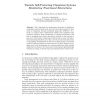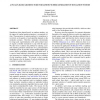241 search results - page 33 / 49 » CACM: past, present, and future |
PUC
2006
13 years 9 months ago
2006
The requirement for spontaneous interaction in ubiquitous computing creates security issues over and above those present in other areas of computing, deeming traditional approaches...
CIVR
2006
Springer
14 years 1 months ago
2006
Springer
Abstract. Interactively learning from a small sample of unlabeled examples is an enormously challenging task. Relevance feedback and more recently active learning are two standard ...
WSC
2008
14 years 5 days ago
2008
Simulations often depend heavily on random numbers, yet the impact of random number generators is recognized seldom. The generation of random numbers for simulations is not trivia...
SERP
2004
13 years 11 months ago
2004
One of the biggest problems of software development is the management of software quality, both in terms of defects and easiness of maintenance. Software production and evolution ...
DYNAMO
2000
13 years 11 months ago
2000
Feedback-directed optimization (FDO) is a general term used to describe any technique that alters a program's execution based on tendencies observed in its present or past ru...


